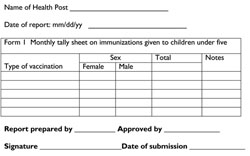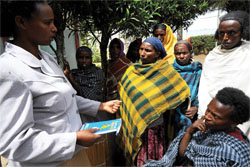Methods of gathering information for monitoring
In reporting your health-related activities, you need to collect information that will tell you how well you have done in terms of your targets, and compare this information with the things you planned to achieve.
Some of the sources of information available to you include:
- Examining records: for example health service records, financial and administrative records.
- Documentation: for example letters, reports, plans, attendance lists, forms, invoices, receipts, minutes of meetings and official reports.
- Continually observing work progress, staff performance and service achievements.
- Discussing progress and any problems with staff and with the community.
When doing your monitoring, what information is routinely collected and what information will you have to collect specially for monitoring?
The whole idea of monitoring is that you do not need to collect special information. All the information you require should be collected on a routine, systematic basis. No special information is required, just the regular statistics that should be gathered during your usual work.
Standard reporting formats, such as tally sheets, need to be designed to collect health information data from the client or patient records.

Standardisation of the reporting format is usually done by the Ministry of Health or regional/district health office. However, as a health professional you may need to develop some data collection forms yourself so that you can collect information about the work that you and your team are doing .
In order to obtain a comprehensive picture of the health status of people in your community, information from additional sources may be needed. You should always have a notebook to collect data as you go about your work. It may also be necessary to collect extra information from sources such as non-governmental (NGO) community-based organisations and nearby health facilities. For example, if a community-based organisation trains peer educators on social mobilisation, or provides services for orphans and vulnerable children, you should collect this information from them so that you can report to the next level about your community health services as a whole.

Information obtained from monitoring can be used to identify day-to-day problems, as well as for regular planning of the health work in your community. It is essential to be aware of the significance of the information you collect and to be confident of its correctness. Records must be reviewed at regular intervals and information must be verified. For example, you may be able to confirm the accuracy of your records by asking questions such as:
- Is the programme or service operating as needed?
- Are the volunteers completing the model household checklists correctly?
- Is training of model households being carried out as intended?
- Does the health facility receive adequate vaccination kits?
What other organisations do you think might provide information that could help you with monitoring the work of the health services within your community?
Not all health service activity is provided by the Ministry of Health; there may also be NGO health-related organisations at work in your area. Other government agencies and community groups may also be involved in keeping people healthy. Your monitoring activities should also include their work.